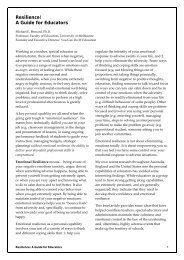Brochure - You Can Do It!
Brochure - You Can Do It!
Brochure - You Can Do It!
- No tags were found...
You also want an ePaper? Increase the reach of your titles
YUMPU automatically turns print PDFs into web optimized ePapers that Google loves.
Working with Teachers and Parents<br />
of Students with Challenges<br />
9<br />
Strengthening the Social and Emotional Capabilities of <strong>You</strong>ng People<br />
with Achievement and Behavior Problems: A Guide for Working with<br />
Teachers and Parents, 2nd Edition<br />
Intended Audience<br />
Primary- and secondary-level educators and mental health practitioners who<br />
work with young people “referred” for achievement and behavior problems<br />
including behavior management coordinators, learning assistance advisors,<br />
school counsellors/welfare officers, psychologists, school principals/assistant<br />
principals and teachers who have responsibility for the planning, coordination and<br />
implementation of individual learning and behavior plans.<br />
Research conducted by Professor Bernard and other scholar-practitioners is<br />
revealing that students who present with motivational, behavioral, emotional and<br />
behavioral challenges have delays in their social and emotional development in one or more of the following<br />
areas: work confidence, persistence (effort), organization, getting along and resilience. In this guide, Professor<br />
Bernard makes the case that special assistance and interventions programs for “at risk” children and young<br />
people need to begin with an assessment of their social and emotional strengths and weaknesses. He argues<br />
that “at risk” students’ social and emotional development can be strengthened through the efforts of their<br />
parents and teachers.<br />
This guide presents educators and practitioners with an eight step plan for “up-skilling” teachers and parents<br />
of “at risk” students in what they need to know and do to strengthen those areas of social and emotional<br />
development that have been delayed.<br />
In this guide, a new role of educators and mental health practitioners is articulated; namely, providing indirect<br />
service to students by providing direct service to their teachers and/or parents. In this model of service delivery,<br />
students are seen as the “clients”, the students’ teachers and parents seen as “consultees” and the educators,<br />
administrators, counsellors or psychologists are deemed “consultants.” The consultant’s responsibility is<br />
working with one or more consultees who, in turn, provide direct service to the client.<br />
Features of the Second Edition include:<br />
Social and emotional development framework for “at risk” young people;<br />
The new role of educators and practitioners: Providing service to teachers and parents;<br />
Dealing with the strong emotions of teachers and parents;<br />
Ways teachers and parents can build positive relationships with ‘at risk’ students;<br />
Detailed review of YCDI Steps for working with teachers and parents including:<br />
Step 1. Entry Evaluation of <strong>You</strong>ng Person (goals established)<br />
Steps 2-3. Meetings with Teacher(s) and Parent(s) (knowledge and skills presented to strengthen<br />
one of the Foundations),<br />
Step 4. Brief Contact: Progress Monitoring,<br />
Step 5-7. Additional Meetings and Progress Monitoring (new knowledge and skills for teachers<br />
and parents to support additional Foundations),<br />
Step 8. Final Meeting (Exit Evaluations of <strong>You</strong>ng Person)<br />
Specific methods teachers and parents can use to develop <strong>You</strong>ng Person’s 5 Foundations<br />
Variety of teacher and parent screening and assessment surveys of “at risk” students<br />
Tens of thousands of children receive weekly lessons from<br />
YCDI! Early Childhood Program.



